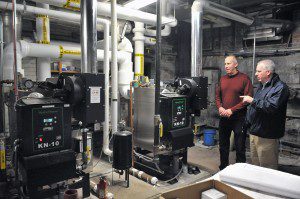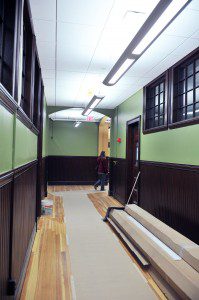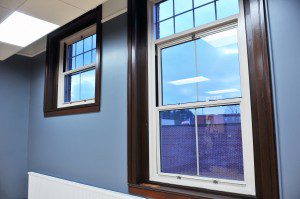
Westfield City Hall renovations have been completed including new energy efficient lighting, state-of-the-art heating and cooling systems, new windows, and a new roof. An open house will be held today at 4 p.m. (File photo by Frederick Gore)
WESTFIELD – As the rain poured down on the rooftop of Westfield City Hall Tuesday morning, Roland Butzke, energy solutions senior account executive for Siemens; Dan Pallotta, project manager for P3 Inc.; Ronald Rix, director of business and technology services for Westfield Public Schools; and Tammy Tefft, Westfield’s director of purchasing; sat in a conference room on the second floor, reminiscing about meetings over the past few years in that very same room, which was routinely too hot or too cold.
Now, thanks to improvements made in two phases to over a dozen city buildings over the past year, the City of Westfield is more energy efficient than ever before.
After spending several million dollars to replace the steam boilers in many of the city’s municipal and educational buildings with more efficient hot water boilers from Mestek, in addition to other renovations, Tefft, Rix, and the reps from Siemens and P3 Inc., two of the corporations charged with the implementation and design of the system overhauls, were satisfied with project and it’s merits.
“Last year’s project, when the Vocational School and the other schools had boilers put in, was unique in and that it married Chapter 149 with funding from the Massachusetts School Building Association,” said Tefft. “The uniqueness of the City Hall project was that it was the marrying of energy management with renovations. One of the challenges was making them coexist together.”
Tefft said that the phase two construction for City Hall had as many as four general contractors on site handling such tasks as asbestos abatement, renovations, and Westfield’s Elm Electric handling the building’s electrical needs.

Westfield Mayor Daniel Knapik, right, and Westfield city hall maintenance employee Tom Curran discuss the new energy-efficient natural gas boilers that heat Westfield City Hall. The new HydroTherm units are manufactured by a division of Mestek Corp. in Westfield and are designed to produce 1,000,000 Btuh each when operating independently. (File photo by Frederick Gore)
“Voc and City Hall were both alike in that they had three general contractors, which is really unheard of,” she said. “Voke had the boiler project, energy management and envelope repairs for it’s roof, brickwork, and windows.”
Tefft added that City Hall also was in dire need of truss repair, an additional project that affected every aspect of the renovations.
Butzke said that implementing the additional trusses wasn’t a surprise.
“You always find things,” he said of fixing the building’s supports. “When we started, we didn’t know (about the trusses). But it affects any and every aspect of the project. We have pipe that’s being run, and now we can’t run it because there’s now a truss there that we didn’t know was going to be there.”
Westfield Vocational-Technical High School, the City’s HeadStart Education Center, the Westfield Athenaeum, three city Fire stations, the Department of Public Works, and the City’s Police Department, as well as Highland, Southampton Road, Paper Mill, and Franklin elementary schools all received improvements in the first phase of project, which began in June 2013 and concluded construction in November, costing in the ballpark of $14 million, along with an MSBA Bond of around $10.7 million, $6.5 million of which was reimbursed from the MSBA.

New energy efficient lighting has been installed both inside and outside Westfield City Hall. (File photo by Frederick Gore)
Phase 2, which began in May and is finishing renovations now, included City Hall, along with North and South middle schools, which ended up costing roughly $9.4 million, while renovations and other associated projects ended up costing roughly $4 million.
“With replacing the boilers, we found it was going to be a ‘like for like’ scenario,” said Tefft. “We were going to be putting a new boiler system in with an old distribution system. The insulation was wood in the Vocational school.”
Butzke said that, by switching the boiler system from steam to hot water, the temperature in the buildings would be more manageable and efficient.
“Steam is produced at 212 degrees, and it is pushed out into the system, and heat rises, so steam doesn’t get pumped, it moves by heat through the system and then rises,” he said. “If it’s a day like today, that starts out at 40, that’s too much temperature, and people overheat.”
Butzke stated that the upper school at Voc-Tech had only one thermostat for the entire building, a three-story structure of 100,00 square feet which was facing air quality issues to boot, in a building that Dan Pallotta said was “held together by duct tape and bubble gum.”
“We worked with the maintenance staff and they showed us pipes that looked like Swiss cheese,” Butzke said. “The building was put up in 1930, so we’re talking about systems that hadn’t had any major renovations since then.”
At one time a model for how to construct a school, Butzke said Voc-Tech’s upper building cost $500,000 to build at the time.
“From a design engineering standpoint, they didn’t build it for today’s codes,” he said. “They were just building a system as best they could. There’s a much different understanding of engineering today.”
“We’ve installed sensors in every classroom to provide information of the amount of heat and air needed, and to add to the efficiency,” Butzke said, while citing panel heaters and dedicated air handling systems as being added at Voc-Tech. “In a vocational school, it’s important to realize there could be six kids in a classroom, and then thirty kids two hours later.”
“It didn’t do us any good to spend MSBA money on project that wasn’t going to last,” Tefft added of the Voke project, which Butzke called “the first one in the state.”
“We haven’t crunched all the numbers because we’re waiting to see how this winter shapes out now that we’ve buttoned up the system,” Butzke said. “We put the system online in October, and between then and December, MSBA’s Green Repair program expected energy savings in the 10 to 15 percent range, and our work would be between eight to 12 percent range, so we thought a combined savings between the two project would be 22 percent. As of January of last year, the efficiencies we saw were tracking in excess of 39 percent savings. Those are fantastic results.”

New energy-efficient windows have been installed throughout Westfield City Hall. (File photo by Frederick Gore)
Regarding the impact of improved efficiency in the city’s municipal and education buildings, Rix said the savings are of great interest to him.
“This year alone, we’ve budgeted over $205,000 less for utilities, which is about 15 percent of our utility cost of $1.4 million,” he said. “We’re on track to save maybe another $8,000-10,000. Looking at our gas bills from last December to this December, it’s 17 percent lower in consumption. This is an exciting time because we’re able to redeploy that (money) to educational software and additional learning opportunities.”
Having been school principal for two decades, Rix knows about keeping students focused, and added that these projects are creating a more comfortable atmosphere in the city’s schools by managing heat more effectively and by pumping clean, fresh air into the buildings.
Butzke also complimented Westfield Mayor Daniel M. Knapik’s leadership in making the projects realities.
“It was a matter of the municipality taking ownership of it,” he said. “Mayor Knapik and Tammy said ‘this is something we need to do’, and getting an Owner’s Project Manager and putting it in place. They said ‘Westfield is a city with a lot of values and history’, City Hall and the Westfield Vocational School are historic buildings. Some people wanted to tear these (buildings) down.”
“We asked ‘is it cost efficient to knock it down and build new?'” said Pallotta. “MSBA asked us about Upper Voke, we asked at City Hall, and we felt it was cheaper to do this. Both buildings are good for another 50 years.”
“We can quantify the energy savings, but what people won’t be able to see are the health benefits, the operational benefits, the comfort of students and teachers and employees,” Butzke said. “That kind of benefit, you know it’s there, but you can’t quantify it.”
According to Tefft, there are still three projects to be done through what remains of the MSBA’s bond, including the stage and gymnasium floor of Westfield Voc-Tech and City Hall’s parking lot.
Westfield City Hall will be hosting an open house today at 4 p.m.

